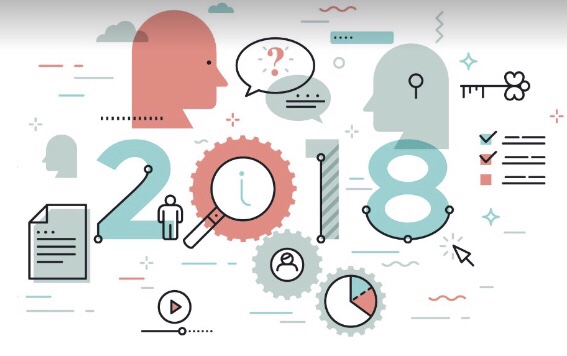It is always a great pleasure to arrive to Brazil, one of my favourite places on Earth.

I have worked here for many years, but the last four years I have been in Brazil 6-7 times a year due to the AEO Brazil programme where I have been Senior Advisor supporting the design, development and implementation of the most advanced trusted trader programme in the world.
What will be the most important tech trends next year?

It is that time of the year again and 2017 is over before we knew it. The Year of Intelligence brought us a lot of progress and change; from over-hyped ICO’s to algorithms that created secret languages. As every year since 2012, I provide you with seven of the most important technology trends for 2018 to help you, and your business, prepare for the next year.
One thing that we can state is that we are on our way to enter the 4th Industrial Revolution. Many of the technologies that have been promised for decades are constantly improving and are now reaching a point of maturity. Once that happens, it will radically change our societies, how we work and how we live. However, we are not there yet.
Although technological developments are accelerating, they have not yet reached the state of full maturity and adoption to cause a paradigm shift in our societies. Nevertheless, it is safe to say we have left behind the Information Revolution of the 1970s, which we have known for so long. Today, information technology is capable of so many great things. However, we are not yet ready to fully enter the 4th Industrial Revolution. That is why I would like to call 2018 the Year of Transition. Let’s have a look at the seven technology trends that will dominate 2018:
1. Artificial Intelligence Will Take a Leap Forward, without Human Data

2017 was the year that AlphaGo Zero taught itself the game of Go and within 40 days became better than any human or artificial player ever existed. It did so without any human data as input and purely played against itself. As a result, it taught itself strategies and moves no human has ever thought of and arguably progressed the evolution of the game of Go exponentially in a very short timeframe. This achievement marks a significant milestone in the development of artificial intelligence.
In 2018, this will only continue and we will see more examples of artificial intelligence that will behave in unexpected ways, as it already did so this year. In 2017, for example, AI developers from Google built algorithms that had to compete for scarce resources, resulting in increasingly advanced strategies to beat the component. Google Brain developed algorithms that created new encryption methods, unlike any seen before, to protect information from other neural networks. Finally, Facebook had to shut down two algorithms that created its own secret language, unsolicited and used advanced strategies to get what it wanted. If one thing becomes clear from these developments, it is that artifical intelligence will be fundamentally different to human intelligence .
With the AI arms race in full swing, governments and organisations are increasing their investments in the development of ever more intelligent AI. In September 2017, Putin said that “whoever becomes the leader in this sphere will become the ruler of the world”, signalling that Russia will intensify its AI activities. On the other side of the world, China aims to outsmart the USA in AI, with Europe unfortunately nowhere to be seen. The AI arms race seriously scares well-known entrepreneurs such as Elon Musk and Stephen Hawking and a solution for the existential threat of AI is still far away.
The combination of an AI arms race and developments where artificial intelligence can be trained without human data will likely result in massive steps forward in 2018. As AI becomes smarter, more money will flow into it. However, ordinary organisations, as well as small and medium enterprises, are likely to miss out, as the power of AI will consolidate among just a few players and countries.
2. Blockchain Will Mature and the ICO Hype Will Slow Down due to Regulation

Last year, I predicted that 2017 would see smart contracts taking off. And so they did, although not in the area that I originally expected. Last year, smart contracts were predominantly used for Initial Coin Offerings (ICOs). The hype around ICOs has amazed many and as of the end of November, 228 ICOs raised a total of 3.6 billion USD. Apart from many successes, there were also many scams and people who tried to game the system and rob people of their money.
Although the number of ICOs will continue to grow in the first months of 2018, we will also see more regulation. Slowly, governments and regulators will wake up and start to understand the impact this new way of funding has on innovation and economic growth. However, they also understand that consumers need to be protected and criminals need to be caught. Hence, there will be increased regulation in the coming year, slowing down the enormous hype of ICOs. We will see better organised ICOs, still raising millions of dollars, and the first example of these new ICOs was the Kik ICO, raising $97 million with an ICO that will pave the way for more mainstream ICOs.
Apart from more mainstream ICOs, 2018 will also see the first true blockchain applications that will be used by consumers and organisations, where those using the services not necessarily know that they use blockchain technology. After all, for Blockchain to become mainstream, it has to become as pervasive as the internet. Consumers do not know how Amazon or Facebook works, but they are more than happy to use it. That is what is required for Blockchain technology, or distributed ledger technology, to have a real impact on organisations and society.
2018 will see more applications being developed and launched, of which many of these by the companies that did do an ICO in 2017. It will move Blockchain towards maturity. Earlier, I discussed seven cryptocurrencies that are worth following and forecasted the end of Bitcoin, as it technically flawed (despite the ridiculous price increase in the past weeks, which reminds me of tulip mania in the 17th century). All in all, 2018 will be a very interesting year in terms of Blockchain.
3. Our Privacy Continues to Be Threatened, but a Solution is Coming

All those new technologies, platforms and services gobble up massive amounts of data and more often than not, this data is not very well protected. For the past years, we have seen thousands of data breaches, with, in 2017, the data breach of Equifax as a new low point. Unfortunately, 2018 will not be any different. The more devices we will connect to the internet, the more data we create, the more security breaches we will see. IoT devices are remarkably insecure, thereby continuing to threaten our privacy. Consumers are aware of this as 90% of consumers lack the confidence that their IoT devices are secure.
As long as organisations that develop internet connected devices do not take security seriously, and develop products such as cardiac devices that can be hacked or CCTV cameras with serious bugs, this trend will only get worse. However, not only IoT devices are prone to hacks, but also large organisations such as Uber or Verizon were hacked in 2017. Even Apple’s latest security feature, Face ID has already been easily bypassed several times. We have reached a point in time where any organisation can and will be hacked and if you are not hacked, you are simply not important enough.
Fortunately, there is a bit of light at the end of the tunnel. With the hype around blockchain, startups are also working on a new technology called Zero Knowledge Proof (ZKP). Zero Knowledge Proof is a method used in cryptography to prove ownership of a specific piece of knowledge without revealing the content of that knowledge. Zero Knowledge Proof enables trustless transactions that safeguard users’ privacy using mathematics. As such, ZKP improves verification processes to such an extent that one party can prove to another party that a given statement is true, without revealing any information about that statement. 2018 will see continued development of Zero-Knowledge Proof, making our society slowly a little bit more private again.
4. A New Approach to Data Ownership is on the Horizon

Fortunately, there is more good news with another new technology slowly making its entry. Thanks to distributed ledger technology, we will see a new approach to data ownership, giving control back to the orinal creator of content or data, instead of the platform where it was created. Not only will this empower consumers to take back control and monetise their data, but it will also enable organisations to share proprietary data with competitors and industry partners without being afraid of theft or loss of a competitive advantage.
2018 will see the General Data Protection Regulation (GDPR) become enforced, changing the way how companies should protect data of European citizens. This new regulation will have a big effect on organisations, but in 2018 we will also see the launch and further development of platforms that go even further and enable secure and private data sharing. It can best be compared to each piece of data having its own vault with its own rules linked to it, governed by smart contracts. Any transaction involved with every piece of data can be tracked and monitored and the data owner can benefit in real-time.
One solution currently in the works is the Fulitsu Data Exchange Network. This platform will enable organisations to share proprietary data with competitors, without having to be concerned about revealing confidential information. Another platform revealed recently is the IOATA Data Marketplace. This data marketplace is focused on Internet of Things devices and sensors. Applications or organisations can select a sensor across the globe, make a micropayment to the owner of the sensor and get direct access to the data stream of that sensor, which can be used for data analytics or applications. A revolutionary marketplace, with already over 30 participants, including Microsoft, Fujitsu, Orange and Accenture.
Such renewed data ownership is enabled by the convergence of Big Data and Blockchain. However, it will require a different approach by organisations. Instead of having a large data lake with all consumer data stored centrally, in the future organisations will have to obtain (technical) consent of each customer to access their data vault and use the data for insights. This would involve more than approving a complicated terms & conditions and most likely requires some sort of payment. Several companies are working on new solutions and in 2018, we will see the first workable applications, requiring organisations to prepare for a new reality of data owned and controlled by consumers.
5. Edge Computing Enables Intelligent Networks

Two years ago I already discussed the upcoming trend of Edge Computing, then called Fog Computing. Edge computing is the key factor to make the Internet of Things work since connected devices will generate so much data that transmitting, storing and analysing all that data at a central location is no longer viable. Not only that, connected devices such as drones, self-driving cars or robots will, most likely, require extreme rapid processing. Creating the data, sending it to the cloud for analysis and returning the results to the device will simply take up too much time.
The predictions are that in the coming decade, we will add approximately 100 trillion sensors to our global economy, generating an unfathomable amount of data. The solution for all this data that requires rapid processing is doing edge computing; computations on the sensor itself, albeit at first this will be done on the device instead of on the sensor. Peter Levine, a general partner at venture capital firm Andreessen Horowitz, even believes that edge computong will slowly take over cloud computing. Although that might sound pretty crazy, it also seems very logical. Today, an average self-driving car produces approximately 1 Gigabyte of data per second, which will likely increase in the years to come. Having to send that data to the cloud, analyse it and return the results would simply not work.
Therefore, in 2018, we will see increased attention to edge computing to enable intelligent networks, where connected devices will perform the required analytics at location and use the results to perform a certain action. It will happen in a few milliseconds, instead of the few hundred milliseconds it takes today when using cloud computing. With self-driving cars that difference can be the difference between a crash or a safe ride home. The world’s cloud computing giants are not ignorant about the opportunities of edge computing. Microsoft has developed Azure IoT Edge and Amazon recently developed AWS Greengrass. In addition, startups such as Packet and Vapor IO are also bringing cloud computing to the edges. In 2018, edge computing will find its way to connected devices, before truly taking off in 2019.
6. A Quantum Computing Arms Race Will Lead to First Results

In this year’s hyle cucle for emerging technologies, Gartner estimated that quantum computing is still more than ten years away. However, the developments in quantum computing are going a lot faster than expected. The race for the holy grail of computing is on and companies such as Google, D-Wave or IBM, universities such as Yale or UNSE or startups such as Rigetti Computong are all working on developing quantum computers. Each of these organisations has reported breakthroughs in 2017, with the latest being IBM who announced the first 50-qubit quantum processor in November 2017.
A 50-qubit quantum processor is getting closer to quantum supremacy, which IBM now estimates to be at around 57-qubits. Quantum supremacy is defined as the ability of quantum computing to solve problems which can no longer be solved with the world’s fastest supercomputer. Not only organisations are working on achieving this quantum supremacy, but also countries are investing billions in it. China is building the world’s biggest quantum research facility. Their objective is to have a quantum computer by 2020 that has the computational power of a million times all computers in the world combined.
With several organisations aiming to reach quantum supremacy before the end of this year, there is a real arms race going on. According to Vijay Pande, a partner at venture capital firm Andreessen Horowitz, quantum computing is moving out of the science domain and into the engineering phase. Therefore, 2018 will likely see several organisations reach quantum supremacy and focus on scaling up the technology to start working on some of the world’s biggest problems.
7. Prescriptive Analytics Will Start to Deliver on its Promises

Finally, the rise of prescriptive analytics. The past few years, we saw the adoption of predictive analytics by many organisations and big data has become a prerequisite for organisations to remain competitive. The biggest corporates and also medium-sized enterprises started implementing predictive analytics solutions to improve their processes, customer experience and bottom-line. Although predictive analytics is a great technology, it is not sufficient in the data-driven world we live in. For that, we need prescriptive analytics.
Prescriptive analytics can be seen as the final stage in understanding a business. It offers recommendations on how to act upon predictions to take advantage of those predictions. It uses a variety of algorithms and data modelling techniques to have a thorough understanding of the environment and improves business performance. Prescriptive analytics leverages predictive analytics and descriptive analytics to derive ideal outcomes or to create solutions to solve your business problems.
In the past years, we have seen many organisations experiment with prescriptive analytics, but it has not reach full-scale adoption. That is changing in 2018. Already, 2017 saw a multitude of organisations developing prescriptive analytics applications, including General Electric, PopSugar (a lifestyle media company) or retailer DSW. The number of startups developing prescriptive analytics solutions is also growing and includes startups such as AIMMS, Ayata and Profitect. In 2018, prescriptive analytics will start to deliver on its promises with the number of applications growing and more organisations benefiting from the final stage in big data analytics.
2018: The Year of Transition
The coming year will be a very exciting year. We truly live in exponential times and slowly we are climbing out of the curve of the hockey stick, meaning that technologies will start to improve exponentially. Artificial Intelligence will become smarter, this time thanks to the lack of human data. We will see the Blockchain market mature and ICOs will become increasingly regulated. Also in 2018, our privacy will be breached, but help is underway in the form of Zero Knowledge Proof. In addition, slowly consumers will get back ownership of the data they create and new marketplaces will enable sharing of proprietary data with competitors. Slowly, cloud computing will make way for edge computing and the arms race of quantum computing will result in quantum supremacy, years before initially anticipated. Finally, organisations will discover the possibilities of prescriptive analytics and thereby significantly improve their bottom line. All in all, it will be a very exciting year as we slowly move into the 4th Industrial Revolution.
What do you think of these seven technology trends for 2018? Anything you want to add? Please join the discussion in the comments below. If you want to download the presentation of the seven top technology trends for 2018, click here.
Source: Mark van Rijmenam. This article originally appeared on Datafloq.
I am spotting this bird again today.

Time to go out in the world and try to change it again, for the better. Another business trip, another mission, another continent, another country.






You must be logged in to post a comment.